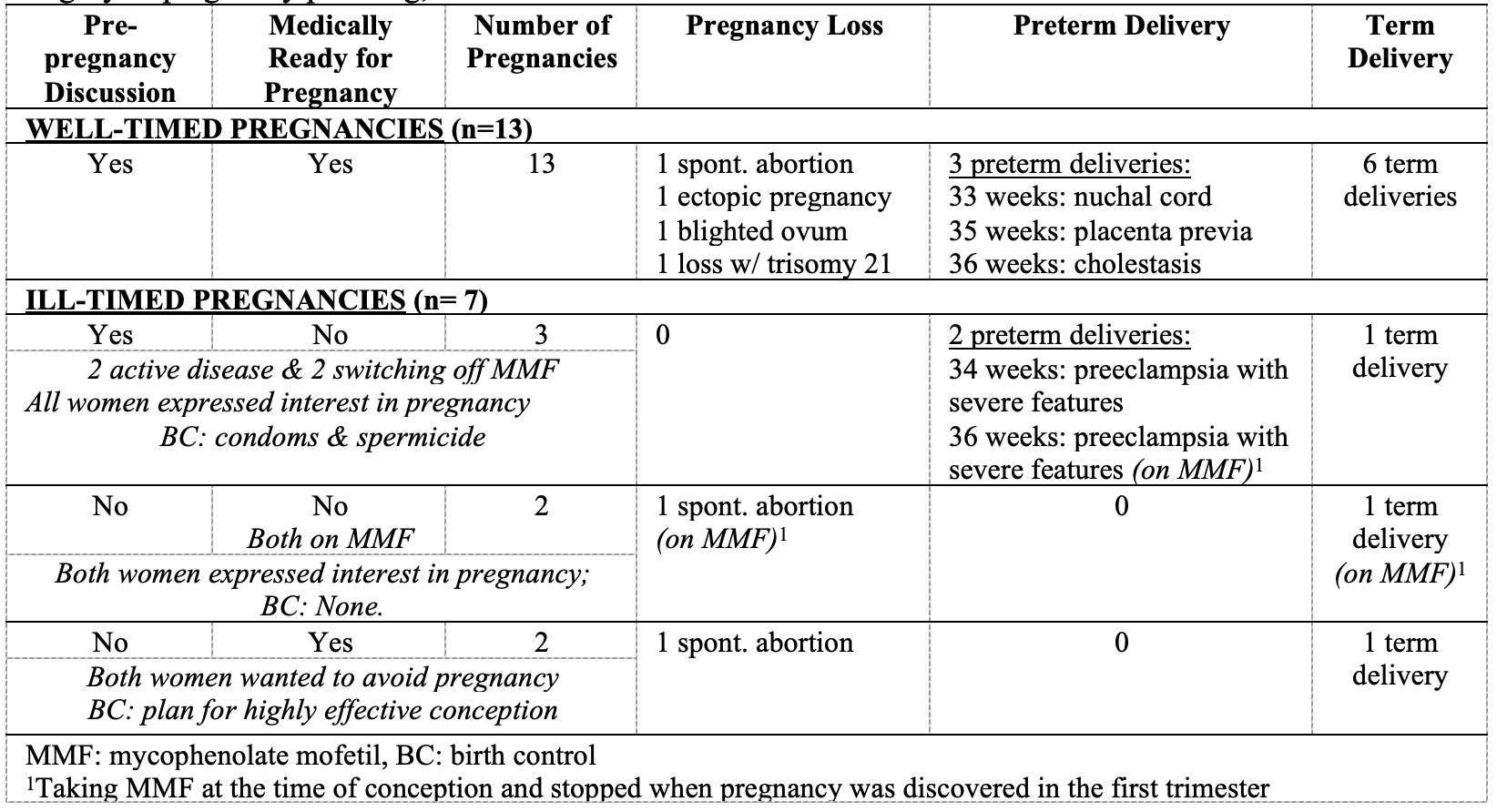Session Information
Session Type: Poster Session B
Session Time: 9:00AM-10:30AM
Background/Purpose: The ACR Reproductive Health Guidelines recommend that a woman conceive when her SLE is quiescent, she is not taking a teratogenic medication, and that she should continue pregnancy-compatible medications, such as HCQ and AZA, to control SLE activity throughout pregnancy. Assisting women with SLE in achieving this well-planned pregnancy, however, is an unmet challenge. We created the HOP-STEP Intervention to ascertain pregnancy interest and contraceptive use, followed by a personalized pregnancy prevention or planning discussion between the rheumatologist and patient with a Discussion Guide. Here we report the medical readiness and pregnancy outcomes among women who received the HOP-STEP Intervention.
Methods: All adult female participants were enrolled in a prospective SLE registry, met SLICC or 1997 ACR criteria for SLE. On an intake form for each clinic visit, women answered 1) “Would you or your partner like to get pregnant in the next 12 months?” and 2) contraceptive use. Women were defined as ‘not medically ready for pregnancy’ if they were taking a teratogen, had proteinuria ≥ 500 mg, or had a physician’s global assessment of ≥ 1.5 at the visit. Women who did not complete the survey were excluded from analysis. ‘Ill-timed’ pregnancies were defined as those conceived when the woman did not intend pregnancy or she was ‘not medically ready’ for pregnancy. Participants were followed for 14-52 months, depending on enrollment date, for pregnancy outcomes.
Results: A total of 42 women in the registry reported an interest in pregnancy with 40 of these women having documentation of a HOP-STEP pregnancy planning discussion. Of these, 16 women conceived 20 pregnancies. Among the 13 well-timed pregnancies, the rates of pregnancy loss (30%) and preterm birth (33% of live births) was high, though none were related to SLE activity or medications (Table 1). Another 3 conceived when not medically-ready for pregnancy due to active SLE and/or mycophenolate (MMF) use. These women had a plan to delay conception using condoms & spermicide but were not interested in more effective contraception due to their strong desire for pregnancy. Two women were interested in pregnancy and not using contraception, but the provider did not have a HOP-STEP pregnancy planning discussion; both of these women conceived while taking MMF. An additional 2 women conceived after reporting they did not intend on pregnancy and were not using contraception. Both had a HOP-STEP contraception discussion with a plan to receive highly effective contraception at the time of conception. Among the ill-timed pregnancies, the rates of pregnancy loss (28%) and preterm birth (40% of live births) was similarly high, though these complications were likely related to teratogen use and/or SLE activity.
Conclusion: Well-timed pregnancies in women with SLE have fewer complications related to teratogen use and SLE activity compared to ill-timed pregnancies. This study highlights the importance of addressing pregnancy planning and contraception in all women at every clinic visit. The HOP-STEP Intervention, when fully implemented, can promote well-timed pregnancies with improved outcomes.
To cite this abstract in AMA style:
Sims C, Eudy A, Doss J, Criscione-Schreiber L, Sun K, Sadun R, Rogers J, Clowse M. The Impact of Pregnancy Planning and Medical Readiness on Reproductive Outcomes in Women with SLE [abstract]. Arthritis Rheumatol. 2022; 74 (suppl 9). https://acrabstracts.org/abstract/the-impact-of-pregnancy-planning-and-medical-readiness-on-reproductive-outcomes-in-women-with-sle/. Accessed .« Back to ACR Convergence 2022
ACR Meeting Abstracts - https://acrabstracts.org/abstract/the-impact-of-pregnancy-planning-and-medical-readiness-on-reproductive-outcomes-in-women-with-sle/

